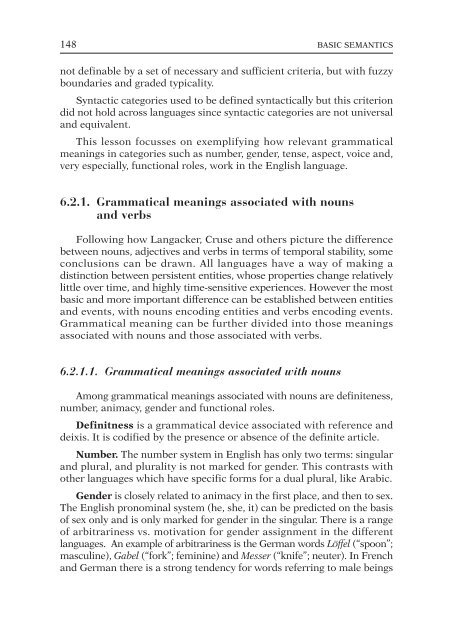Semantics
Create successful ePaper yourself
Turn your PDF publications into a flip-book with our unique Google optimized e-Paper software.
148 BASIC SEMANTICS<br />
not definable by a set of necessary and sufficient criteria, but with fuzzy<br />
boundaries and graded typicality.<br />
Syntactic categories used to be defined syntactically but this criterion<br />
did not hold across languages since syntactic categories are not universal<br />
and equivalent.<br />
This lesson focusses on exemplifying how relevant grammatical<br />
meanings in categories such as number, gender, tense, aspect, voice and,<br />
very especially, functional roles, work in the English language.<br />
6.2.1. Grammatical meanings associated with nouns<br />
and verbs<br />
Following how Langacker, Cruse and others picture the difference<br />
between nouns, adjectives and verbs in terms of temporal stability, some<br />
conclusions can be drawn. All languages have a way of making a<br />
distinction between persistent entities, whose properties change relatively<br />
little over time, and highly time-sensitive experiences. However the most<br />
basic and more important difference can be established between entities<br />
and events, with nouns encoding entities and verbs encoding events.<br />
Grammatical meaning can be further divided into those meanings<br />
associated with nouns and those associated with verbs.<br />
6.2.1.1. Grammatical meanings associated with nouns<br />
Among grammatical meanings associated with nouns are definiteness,<br />
number, animacy, gender and functional roles.<br />
Definitness is a grammatical device associated with reference and<br />
deixis. It is codified by the presence or absence of the definite article.<br />
Number. The number system in English has only two terms: singular<br />
and plural, and plurality is not marked for gender. This contrasts with<br />
other languages which have specific forms for a dual plural, like Arabic.<br />
Gender is closely related to animacy in the first place, and then to sex.<br />
The English pronominal system (he, she, it) can be predicted on the basis<br />
of sex only and is only marked for gender in the singular. There is a range<br />
of arbitrariness vs. motivation for gender assignment in the different<br />
languages. An example of arbitrariness is the German words Löffel (“spoon”;<br />
masculine), Gabel (“fork”; feminine) and Messer (“knife”; neuter). In French<br />
and German there is a strong tendency for words referring to male beings



